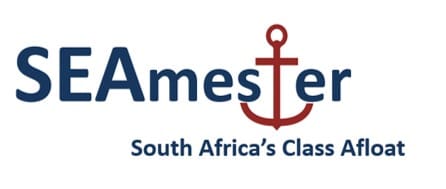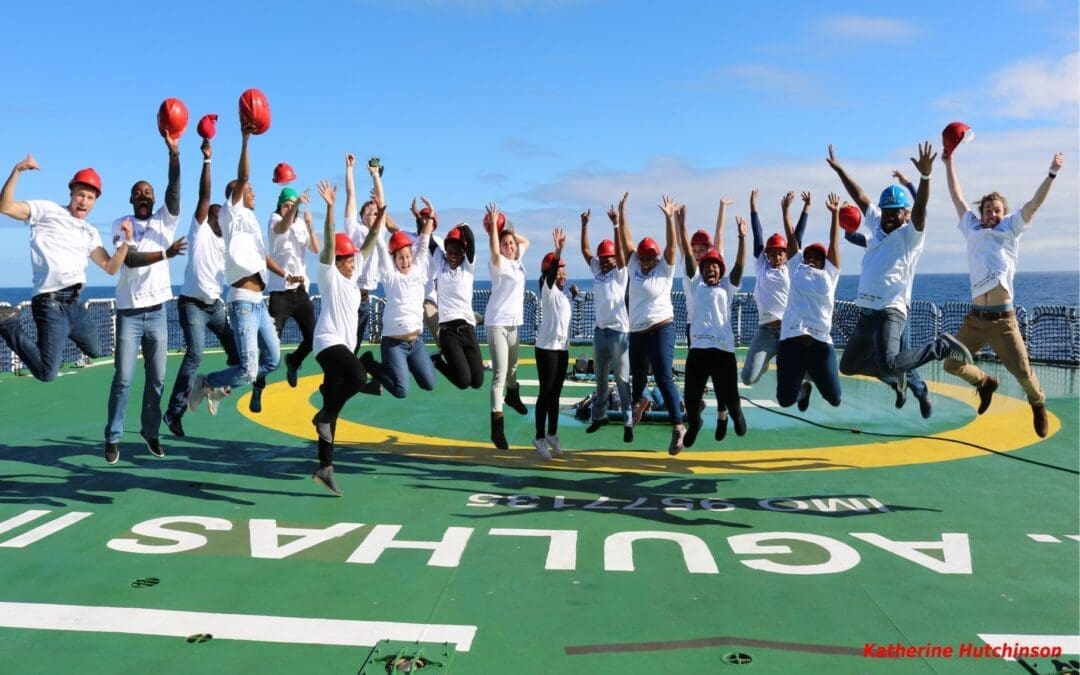 The UN’s Decade of Ocean Science calls for programmes that improve scientific knowledge, develop research capacities and transfer marine technological information and expertise across generations. In South Africa, the Department of Science and Innovation’s (DSI) has already taken a significant step forward in such training measures. The current DSI Global Change Grand Challenge programme1 calls for platforms that “attract young researchers and retain them by exciting their interest in aspects of global change, while developing their capacity and professional skills in the relevant fields of investigation”. To meet these challenges in the Ocean Sciences, SEAmester – South Africa’s Floating University and a joint initiative between Government and Universities was started in 2016. The strength of SEAmester is that South African postgraduate students combine theoretical classroom learning with the application of this knowledge through ship-based, and more importantly, hands-on research through the Agulhas System Climate Array (ASCA) programme.
The UN’s Decade of Ocean Science calls for programmes that improve scientific knowledge, develop research capacities and transfer marine technological information and expertise across generations. In South Africa, the Department of Science and Innovation’s (DSI) has already taken a significant step forward in such training measures. The current DSI Global Change Grand Challenge programme1 calls for platforms that “attract young researchers and retain them by exciting their interest in aspects of global change, while developing their capacity and professional skills in the relevant fields of investigation”. To meet these challenges in the Ocean Sciences, SEAmester – South Africa’s Floating University and a joint initiative between Government and Universities was started in 2016. The strength of SEAmester is that South African postgraduate students combine theoretical classroom learning with the application of this knowledge through ship-based, and more importantly, hands-on research through the Agulhas System Climate Array (ASCA) programme.
 The mid-term goal of SEAmester is to attract and establish a cohort of proficient marine and atmospheric science graduates who will contribute to filling the capacity needs of South African marine science. Furthermore, by involving researchers from across all the relevant disciplines and tertiary institutions in South Africa, SEAmester provides an opportunity to continue building a network of collaborative teaching within the marine field. In doing so, these researchers will foster and strengthen new and current collaborations between historically white and black universities. A core aim of SEAmester will be to transform the number of numerate postgraduate students entering the marine sciences. Within South Africa there continues to be an urgent need to redress the demography of scientists involved in oceanographic research, which remains skewed towards white South Africans. SEAmester has already proven to be extremely effective in responding to these challenges. Since its inception in 2016, over 120 male and 140 female students from 26 tertiary institutes, have been trained onboard the SA Agulhas II. With 64% of the enrolled students being black South African and from previously disadvantaged universities . Greater awareness of the ocean’s physical, biogeochemical and ecological response to climate change, highlighted through ship-board experiences, has already started to inspire and attract students into the marine sciences. This is a critical step if a new generation of marine scientists with a far higher calibre in the sciences are to be trained. Most importantly, SEAmester has already created opportunities for students from all social backgrounds to experience working life at sea. By achieving a more quantitative and experienced input into our postgraduate pipeline, we will, as a scientific community, greatly improve our long-term capabilities to accurately measure, model and predict the impacts of current climate change scenarios. We fully expect this to continue and to ensure that students who excel in numeracy, despite diverse economic, educational, ethnic and social backgrounds, are aware, have equal access to the benefits and opportunities afforded through this programme.
The mid-term goal of SEAmester is to attract and establish a cohort of proficient marine and atmospheric science graduates who will contribute to filling the capacity needs of South African marine science. Furthermore, by involving researchers from across all the relevant disciplines and tertiary institutions in South Africa, SEAmester provides an opportunity to continue building a network of collaborative teaching within the marine field. In doing so, these researchers will foster and strengthen new and current collaborations between historically white and black universities. A core aim of SEAmester will be to transform the number of numerate postgraduate students entering the marine sciences. Within South Africa there continues to be an urgent need to redress the demography of scientists involved in oceanographic research, which remains skewed towards white South Africans. SEAmester has already proven to be extremely effective in responding to these challenges. Since its inception in 2016, over 120 male and 140 female students from 26 tertiary institutes, have been trained onboard the SA Agulhas II. With 64% of the enrolled students being black South African and from previously disadvantaged universities . Greater awareness of the ocean’s physical, biogeochemical and ecological response to climate change, highlighted through ship-board experiences, has already started to inspire and attract students into the marine sciences. This is a critical step if a new generation of marine scientists with a far higher calibre in the sciences are to be trained. Most importantly, SEAmester has already created opportunities for students from all social backgrounds to experience working life at sea. By achieving a more quantitative and experienced input into our postgraduate pipeline, we will, as a scientific community, greatly improve our long-term capabilities to accurately measure, model and predict the impacts of current climate change scenarios. We fully expect this to continue and to ensure that students who excel in numeracy, despite diverse economic, educational, ethnic and social backgrounds, are aware, have equal access to the benefits and opportunities afforded through this programme.
A long-term vision is to develop SEAmester into an international educational flagship programme incorporating a wider participant and scientist list with the involvement of other SADC countries. The success of the past 6 cruises onboard the SA Agulhas II has confirmed to the scientific community that SEAmester – South Africa’s Floating University – is able to achieve just that.
Text Supplied by Prof Isabelle Ansorge
Feature image by Katherine Hutchinson






